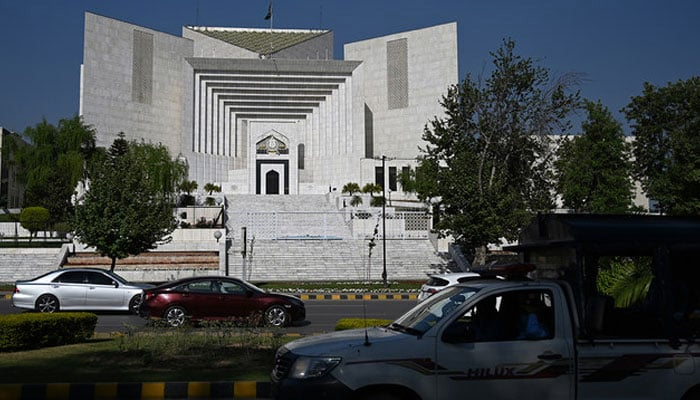Accused entitled to bail if trial not concluded within two years: SC
ISLAMABAD: The Supreme Court (SC) has held that an accused was entitled to bail if the trial was not concluded within the period specified, mentioned in the Code of Criminal Procedure, 1868 (CrPC) i.e. two years.
A three-member bench of the apex court comprising Justice Amin-ud-Din Khan and Justice Athar Minallah issued a written order in the appeal filed by one accused Muhammad Usman against the judgment of Lahore High Court in a murder case.
The court accepted the bail application of the accused against surety bond of Rs2 lacs. The court heard the matter on November 30, 2023.
The accused, Muhammad Usman, was arrested on 29.04.2021 because he was nominated in FIR No139/2021, dated 30.3.2021, registered at the Police Station Phularwan, District Sargodha, for allegedly committing the offences under sections 302, 148, 149 and 109 of the Pakistan Penal Code, 1860 (PPC).
The petitioner had filed his first application seeking bail on merits and it was dismissed by the High Court on 27.9.2022. He then filed another petition which was not pressed in order to avail the remedy on the fresh ground of delay in the conclusion of trial.
This ground had not ripened when the two petitions were filed. Since the second petition was not pressed, therefore, it was dismissed by the High Court vide order dated 19.5.2023. Consequently, a third petition was filed on the sole ground of seeking bail on statutory delay.
The petition was, however, dismissed vide order dated 10.8.2023 on account of non-prosecution. The petitioner filed a fresh petition and it was dismissed by the High Court vide the impugned judgment dated Crl.P.1233/2023 2 03.10.2023.
The petitioner then moved the Supreme Court seeking leave against the impugned judgment.
“It is also not disputed that, despite more than two years of continuous incarceration of the petitioner, the trial has not concluded,” says the written order authored by Justice Athar Minallah.
The court held that the delay in conclusion of trial is not attributable to the petitioner nor his counsel, rather, it has been on account of the abscondance of co-accused and their surrender or arrest at different times.
“Each time the charge had to be reframed, the court noted adding that in response to their repeated queries, the learned State Counsel could not persuade us that the delay in conclusion of the trial could be attributed to the petitioner,” the order said.
The court noted that the petitioner was not at fault and yet he had to suffer the hardship of incarceration of more than two years adding that the co-accused are stated to be close relatives of the petitioners and, therefore, the state counsel has argued that his complicity could not be ruled out.
The court held that the delay caused by the co-accused is not attributable to the petitioner because no act or omission on the latter’s part nor a person acting on his behalf could be shown.
“The right of an accused to seek bail on statutory grounds cannot be defeated for any other reason except on the ground as has been explicitly described under the third and fourth provisos to section 497(1) of CrPC,” says the order.
The court held that the accused becomes entitled to bail as of right after the statutory period expressly stated in clauses (a) and (b), as the case may be, have expired and the trial has not concluded.
-
 Columbia University Sacks Staff Over Epstein Partner's ‘backdoor’ Admission
Columbia University Sacks Staff Over Epstein Partner's ‘backdoor’ Admission -
 Ozzy Osbourne's Family Struggles Behind Closed Doors
Ozzy Osbourne's Family Struggles Behind Closed Doors -
 Dua Lipa Claims Long-distance Relationship 'never Stops Being Hard'
Dua Lipa Claims Long-distance Relationship 'never Stops Being Hard' -
 BTS Moments Of Taylor Swift's 'Opalite' Music Video Unvieled: See Photos
BTS Moments Of Taylor Swift's 'Opalite' Music Video Unvieled: See Photos -
 Robin Windsor's Death: Kate Beckinsale Says It Was Preventable Tragedy
Robin Windsor's Death: Kate Beckinsale Says It Was Preventable Tragedy -
 Rachel Zoe Shares Update On Her Divorce From Rodger Berman
Rachel Zoe Shares Update On Her Divorce From Rodger Berman -
 Kim Kardashian Officially Takes Major Step In Romance With New Boyfriend Lewis Hamilton
Kim Kardashian Officially Takes Major Step In Romance With New Boyfriend Lewis Hamilton -
 YouTube Tests Limiting ‘All’ Notifications For Inactive Channel Subscribers
YouTube Tests Limiting ‘All’ Notifications For Inactive Channel Subscribers -
 'Isolated And Humiliated' Andrew Sparks New Fears At Palace
'Isolated And Humiliated' Andrew Sparks New Fears At Palace -
 Google Tests Refreshed Live Updates UI Ahead Of Android 17
Google Tests Refreshed Live Updates UI Ahead Of Android 17 -
 Ohio Daycare Worker 'stole $150k In Payroll Scam', Nearly Bankrupting Nursery
Ohio Daycare Worker 'stole $150k In Payroll Scam', Nearly Bankrupting Nursery -
 Michelle Yeoh Gets Honest About 'struggle' Of Asian Representation In Hollywood
Michelle Yeoh Gets Honest About 'struggle' Of Asian Representation In Hollywood -
 Slovak Fugitive Caught At Milano-Cortina Olympics To Watch Hockey
Slovak Fugitive Caught At Milano-Cortina Olympics To Watch Hockey -
 King Charles Receives Exciting News About Reunion With Archie, Lilibet
King Charles Receives Exciting News About Reunion With Archie, Lilibet -
 Nvidia Expands AI Infrastructure With Nevada Data Centre Lease
Nvidia Expands AI Infrastructure With Nevada Data Centre Lease -
 Royal Family Shares Princess Anne's Photos From Winter Olympics 2026
Royal Family Shares Princess Anne's Photos From Winter Olympics 2026




